
Confidence: A Core Interview Problem
The thing that most candidates lack so often isn’t qualification or skill, but the confidence to handle the questions thrown at them. For this very reason, they find themselves lost and confused during the interaction. Knowing common questions beforehand can be very helpful for presenting a more confident self in front of the interviewer.Common Fresher Interview Questions
For fresher candidates who are facing interviews for the first time, we bring here the Top 20 fresher interview questions and their best answers:1. Tell me about yourself.

Why this question:
The interviewer won’t jump to level difficult. They are experienced enough to handle all type of interviewees so the first question is normally to make the person comfortable. This doesn’t mean that the answer isn’t considered.What are they ‘really’ asking:
It’s easy amble through on this one. After all, you have known yourself for many years. However, if you go into this without any preparation, then all those years won’t count for much.By asking this question, the interviewer usually intends to know things beyond your resume.
How to answer:
Prepare well for this question and answer smartly. It would be better if you give a quick but well-defined summary of your background.Here are a few cues:
- Talk about your professional self, precisely.
- Don’t go into your whole life story.
- Talk about your achievements and strengths,
- Indulge in specifics, but don’t narrate your resume.
The Right Answer:
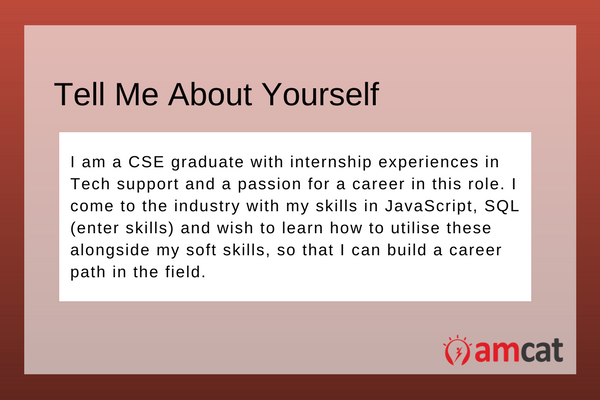
2. Why should we hire you?

Why this question:
Direct and to the point, it’s not a chance to talk about why it’s a good opportunity for you. Afterall, you were shortlisted and did beat so many applicants to sit on the hot seat and that means something.It’s a self-analysis to check your suitability for the position being offered.
What are they ‘really’ asking:
By asking this question, the interviewer usually wants to ask “What makes you best-fit for this position?”How to answer:
Focus on your qualifications and skills and how they can help the company.- Start with your professional persona and move on to how you stand out vis a vis others with the same qualification.
- Match those to the job description for the position
- Add traits that will help the company’s business position and show you in line with the company’s business ideologies and processes.
- Improvise according to the company’s requirements.
The Right Answer:
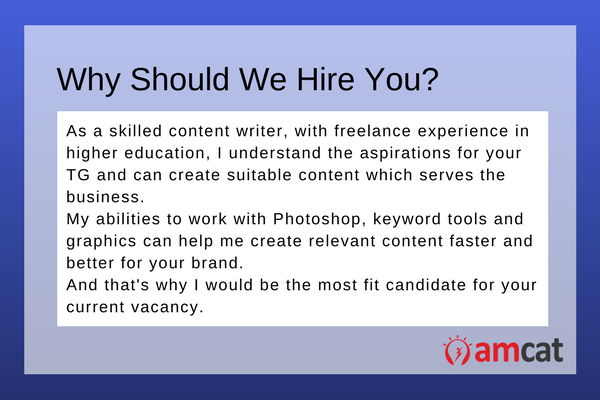
3. What are your strengths?

Why this question:
This question is to test how you will respond to something like this and that is why you need to put in some thoughts and preparations to get it right. Despite being one of the most widely asked questions in job interviews, interviewees tend to mess it pretty often.How to Answer:
Do not use too many adjectives or go on with a list of strengths you have. Instead, sit, think, relax, choose one or two skills and explain why you consider having those strengths. Include strengths that the company is looking for. Some prior research will provide you with enough clues for that. And, even if you have an impressive list of strengths to your name, try not to come across as too arrogant.Stay positive throughout your answer. You can begin by saying – “I have strong ethics while at work. When I have to meet some deadlines at work, I try to complete it within the stipulated time or ahead of that. While I was in my college…”
The Right Answer:
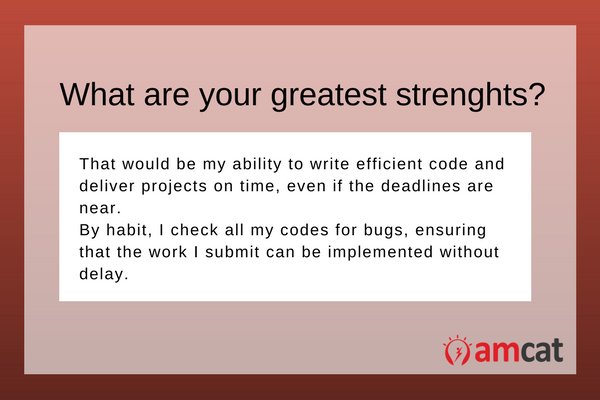
4. What are your weaknesses?

Why this question:
According to an interesting write-up on ‘The Business Insider‘, – What Hiring Managers Really Want To Know – the question is a test of character. If I were to liken it to an onion, it is a question with multiple layers, which can be peeled through for each of them.The first layer is obvious – there are looking for cues or red flags on why they should not hire you. Next, they are looking at your ability to be prepared and maintain composure in a difficult setting. They also want to know how self-aware you are and whether you’re doing anything to overcome them.
What are they ‘really’ asking:
Summarising the points given above, here are the real questions nestled within a broader ‘What are your weaknesses’.- Why should we not hire you?
- How do you react in a pressure situation?
- How self-aware are you?
- Would your weaknesses impact your job performance?
- What are you doing to improve on your weaknesses?
How to Answer:
Do not say that you don’t have any because that’s arrogant, overconfident, and practically not true! Instead, talk about your weaknesses and talk about how you are working towards eliminating them.Do not count waking up late, drinking, smoking, etc. as your weaknesses.
The Right Answer:
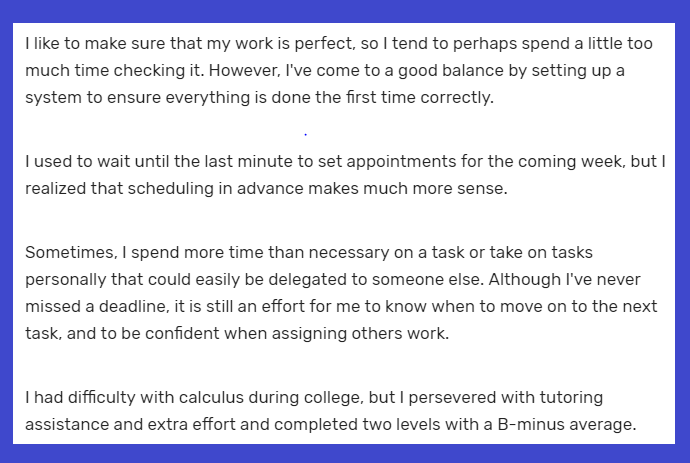
5. What are your long-term goals? What are your short-term goals?

Why this question:
From a recruiter’s perspective, the job interview is the best time to get focused information from a candidate, which will help them make a decision about them. Asking about their goals, both short-term and long-term goals, helps these recruiters understand where they are coming from and what plans they have for their lives.What are they ‘really’ asking:
This also lets them decide whether the candidate would be a good hire and would stay in the company. What motivates them and where would they go, if they face an opportunity in line with those goals – both internally and externally.How to Answer:
Haven’t thought about your future, five years down the line, let alone in the coming six months? Start thinking. This is how you can answer this fresher interview question.- Think of what you want to do in 6 months, 1 year, 5 years
- Include the Company in your plans
- Begin explaining short-term goals.
- Include long-term goals, but don’t talk about salary or explicit details
The Right Answer:
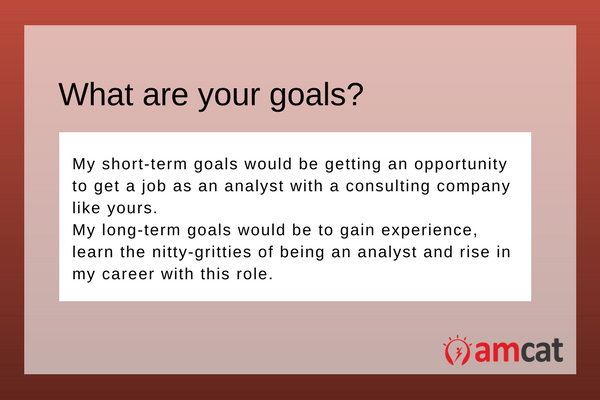
6. How well do you handle stress/pressure?

Why this question:
When an interviewer asks you this question, he is keen on knowing how you are affected by pressure and what is your way of managing it.What are they ‘really’ asking:
The interviewer is checking for your composure, work ethics and how you actually stand against real-life situations.They’re asking:
- What are your stress points
- Do they impact your job performance
- What do you do in a crisis situation
- What are your weaknesses – things which can put you in a crisis situation.
- How do you handle such a situation
How to Answer:
You need to be well-prepared for this in advance as you can’t get away by saying you are never affected by any kind of work pressure. After all, almost every individual get affected by work pressure at any point of time.The best way you can answer this question is by giving specific instances from the past when you managed to do good in spite the tremendous pressure. That can give a clear picture to the interviewer about your ways of handling stressful situations.
The Right Answer:
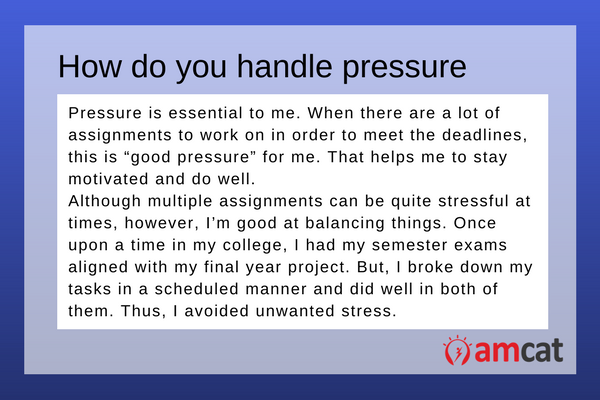
7. Are you willing to relocate/travel for work?

Why this question:
A recruiter who asks this question is more privy to the demands of the job position than the candidate. And they’re filtering candidates on different counts – one being flexibility and availability at different locations and the other being an inclination to go places for the job.They are also checking on your enthusiasm and willingness for the job on offer and the company.
What are they ‘really’ asking:
With this one question the recruiter asks you:- Would you be open to travel for the job?
- Would you be open to transfers for the job?
- Would you be able to come in, when required?
- Are you really keen on this job?
How to Answer:
While answering this question, emphasize on your willingness to work with the company. Show your enthusiasm for the job role.Don’t respond with a ‘No’ even if you are not willing to relocate.
The Right Answer:
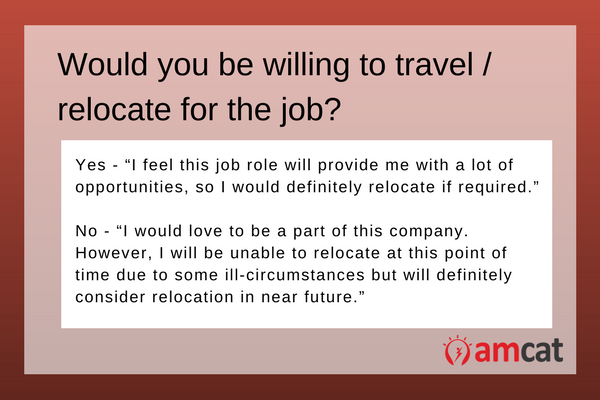
8. What are your hobbies?

Why this question:
A recruiter might be interested in knowing about your health, energy level, or your ability to gel with your colleagues. Doing things apart from the job means that you are an all-rounder and your hobbies give an insight into the type of person you are.What are they ‘really’ asking:
Specifically, the question behind the question on your hobbies and interests depends on who is asking it. If it’s the HR or the first-line recruiter, they want a better understanding of you as an individual and your commitment levels to your interests.If it is from your reporting manager, then it’s to get a better sense of you and whether they would be able to get along with you, beyond the formal office structure.
How to Answer:
There are certain hobbies and interests that should obviously not be discussed in an interview. Even if your favorite time-pass is partying, it is advised not to say it at all. Same goes for activities like gambling, drinking, smoking, or any other illegal activity.While answering this question, make sure that you are honest and your hobbies are genuine. Don’t say that you are a fitness enthusiast even if it’s been more than a year since you last hit the gym.
Whatever you say, be prepared for follow-up questions. For example, if you say you love watching movies, be prepared for the last movie you watched, or the type of movie that excites you.
In short, include these things:
- Mix professional and personal interests
- Mention positives – things that contribute to you (health, education, learning)
- Mention positives with community good – volunteering, green initiatives, helping others
- Include your passions and be prepared for follow-ups
The Right Answer:
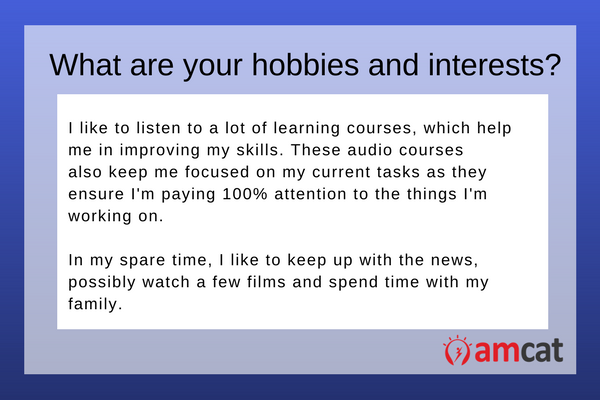
9. When can you start?

Why this question:
Usually, employers ask this question when they hire for an immediate joining and the position is essential to company’s operations.What are they ‘really’ asking:
The recruiters are judging your position right now – how eager you are for this position and how soon would they be able to close it, if they hired you.A quick as soon as possible means you need this job straight up – maybe you’re between jobs and gives them an upper hand in the negotiation process.
How to Answer:
While answering this question, avoid sounding too desperate (even if you want to start it right at the moment!).The best way you can respond to this question is by conveying that you wish to start it as soon as possible.- Communicate your eagerness to join soon.
- Factor in your current commitments – for a fresher these could be the time you graduate, any upcoming plans
- Give a clear date
- Ask about the company’s needs and requirements
The Right Answer:
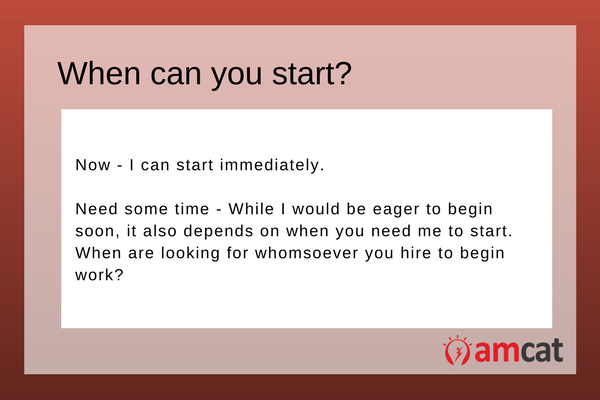
10. Where do you see yourself in 5-10 years?

Why this question:
An open-ended approach to knowing about your career goals, this is an attempt to learn about the maturity level of the candidate, their willingness and dedication to the prospective job.What are they ‘really’ asking:
Repeating the above point, here are what they’re really asking:- Your goals
- Your willingness to continue with the brand
- Whether you would be a good role fit
How to Answer:
So, how do you answer this question? You can be honest and still answer them what they expect to hear from you. Just think about where this position can actually take you and how that is in line with your broader career goals.The best you can do is be honest and try to keep your answer relevant to your job and the industry. Don’t share your plan of writing a novel in five years when you are applying for the position of a Programmer.
The Right Answer:
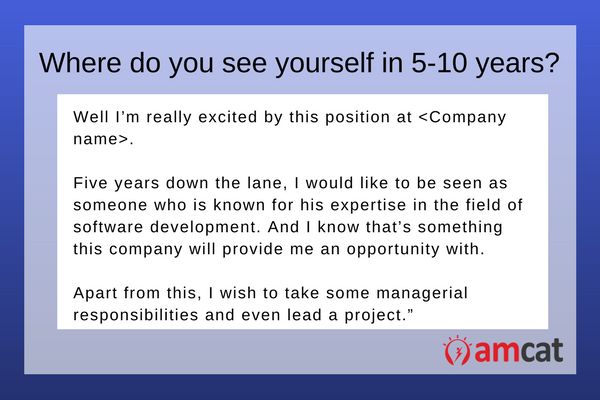
11. What’s your dream job?

This is a very tricky question. It might happen that your dream job has nothing to do with the job for which you are being interviewed. Still, avoid mentioning it. Rather try connecting it to the position for which you are being interviewed.
Why this question:
Interviewers ask this question to know how this position motivates you. Or, whether you will stick to the position or you just want to take this up as a short-term assignment.What are they ‘really’ asking:
When a recruiter asks you about your dream job, they’re really asking you these questions:- What is your motivation
- What are your positive stress points
- Do these idyllic aspirations match our work environment
- Would you fit into the current role/organisation
How to Answer:
Ideally, you should not answer specific job titles. Don’t share your ambitions about a job whose responsibilities are far from achievable while staying in the position that you are applying for. A good idea is to focus more on skills and not the designation.Focusing on the industry is the key to answering this question.
The Right Answer:
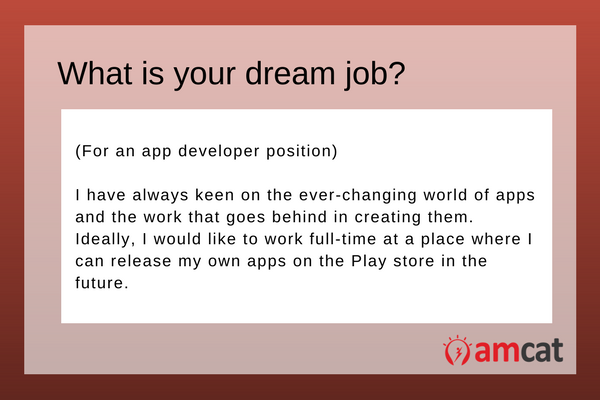
12. Are you comfortable with late night and weekend shifts?

Why this question:
The question doesn’t mean your company is planning on ruining your weekends. But depending on workload, companies do need flexible candidates who can handle the pressure at the workplace and work late when required.What are they ‘really’ asking:
The recruiter is asking you:- How flexible are you?
- Can you take initiative to sacrifice personal time for a situation?
- Can you handle workplace pressure?
- Can we rely on you to step up, if required?
How to Answer:
Ideally, a carefully enthusiastic response towards being occasionally willing to do so, is a good way to go.If you aren’t comfortable with it for some reason, state the reason politely. Or you can just say that it would be fine once in a while but you normally prefer maintaining a work-life balance.
The Right Answer:
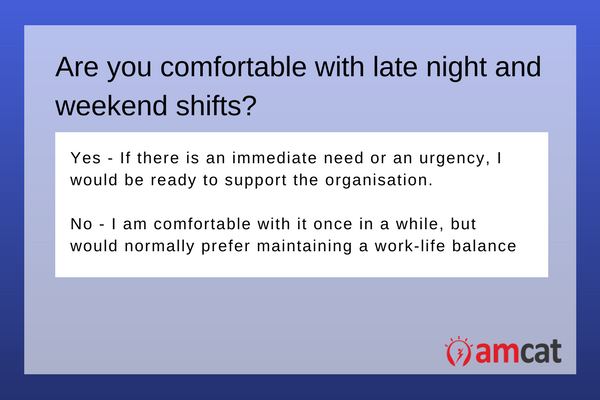
13. Create an imaginary difficult work situation and tell us how you will overcome it?

Why this question:
Interviewers ask this question in order to know how you will deal with an unprepared situation that might arise during your work tenure.What are they ‘really’ asking:
A basic, open-ended question this allows the interviewer to understand the candidate beyond scripted answers and the brief on their resume. It also lets them understand the likely ways in which the candidate would respond to challenges and the kind of situations they may face in their role.How to Answer:
When this question is thrown at you, stay calm and composed. Go back to the past and think of any difficult situation you might have faced. It can be anything related to your past academics or professional career.You can tell about the dilemma of choosing your stream in the college, or about the unconventional career path you had to choose for yourself. You can mention who helped you during that stage of your career. Or, if you had to choose an unconventional career for yourself, how you persuaded your family members.
If you can’t link this question to any incidence from the past, you can instead relate it to your job description of the current job. You should develop an idea of unusual scenarios that might arise while in the job and the possible outcomes of that. Avoid giving a long and unnecessary description. Your ideal response should be short and supported by relevant facts.
The Right Answer:
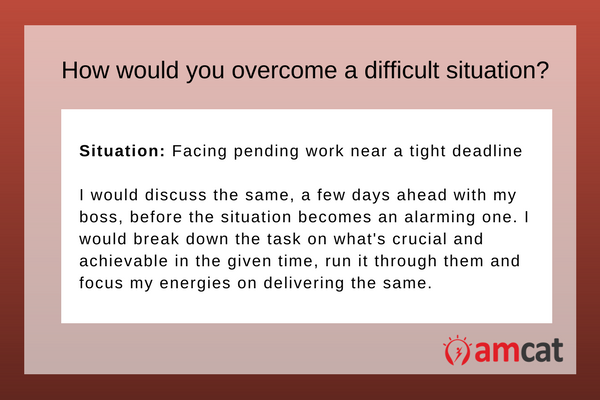
14. What’s your biggest accomplishment?

Why this question:
An interviewer intends to know about your biggest achievements at work in the past and also about your work ethics.What are they ‘really’ asking:
They wish to analyse you in a larger sense, beyond the scope of standard interview questions and the resume. Your answer helps them gauge your level of maturity, insight, how you act in different situations. It is also an insight into your soft skills – confidence, problem-solving, initiative, self-management and adherence to tasks.How to Answer:
The best you can do is tell about an accomplishment that is directly related to your job. Give an instance from the last job where you did extremely well. Keep in mind that you mention the accomplishment that added value to the company. Focus more on the core values and show them how you can be an asset to the company.On the other hand, don’t lie if you don’t have anything concrete to tell. Be honest that you are still waiting for something that can be called as your biggest accomplishment.
The Right Answer:
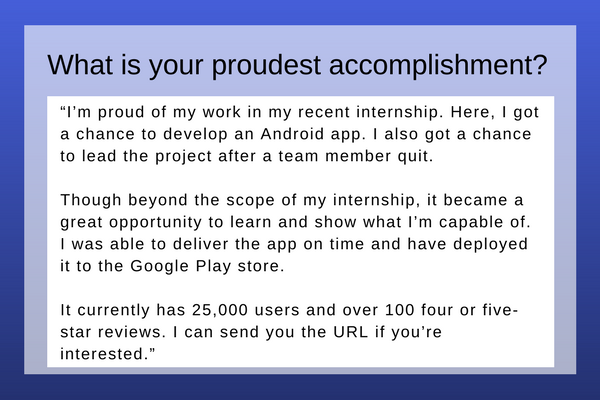
15. How much salary do you expect?

Why this question:
From the interviewer’s perspective, this question is an obvious filter – whether the candidate would realistically fit the company’s budget or not. It is also a judgment call – on maturity, self-awareness and industry awareness.What are they ‘really’ asking:
Here is a list of questions they are really asking:- Have you thought about your worth?
- What kind of salary do you expect?
- Do you fit our budget?
- What is the scope of negotiation?
- Should we select you?
How to Answer:
Just because they are asking doesn’t mean you will get what you quote. In fact, it’s a test as well. Do not say something that doesn’t go well with the position. Do your research before you quote any number. And, in other words, be realistic and keep in mind what not to say in an interview.The Right Answer:

16. What do you know about this company?

Why this question:
Interviewers ask this question to know if you care enough to do research about the role and the company before coming to attend the interview. Their goal is to hire people who want a specific job in the company and someone who is passionate about working there. They also want to judge your level of curiosity to know things.What are they ‘really’ asking:
Here is what they’re really asking:- Are you really serious about this job?
- Have you invested time and effort in researching about our company?
- How well do you know us? Our sector? Our strengths and Weaknesses?
- Should we invest in you and bring you in as an asset to us?
How to Answer:
If you didn’t do your homework well, you can’t actually answer this question without stumbling and guessing. Read and research about the company you are interviewing for. More similar questions can be raised, so be prepared with enough information to build your answers on.The Right Answer:
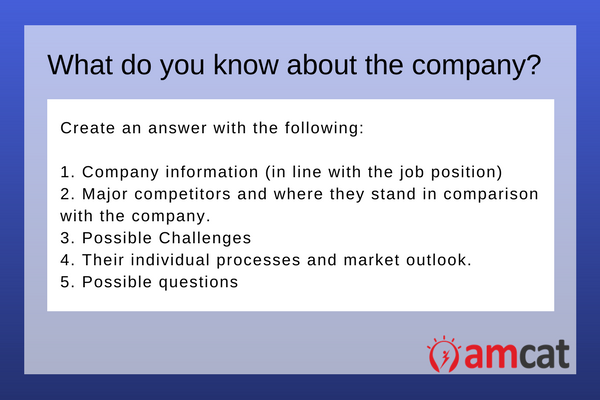
17. Who do you think are our main competitors?

A hiring manager wants to know how aware you are of the field you are gearing for. And, the other companies with which they compete. Your answer to this question shows your degree of awareness of the industry.
What are they ‘really’ asking:
They wish to know whether you’ve done the comprehensive company research, which would make you an essential hire. So, it boils down to assessing the seriousness, dedication and maturity of the candidate.How to Answer:
To answer this question, you need to do a research about the chief rivals of the company. Ensure that you don’t speak out the gathered facts to the interviewer. Rather you should present an analyzed version.You must not provide wrong facts and figures and disregard a firm in any manner. By doing this, you can reduce your credibility. Don’t forget that the sole aim of the interviewer is to understand how your services can help the company in beating its major competitors.
The Right Answer:

18. What are your thoughts about working in a team?

It is an unsaid rule that companies look for employees who can gel in well with their teams. Team players are future leaders, and a candidate who can’t work well in a team is more of a liability to the company than an asset.
Why this question:
Beyond core skills, the move towards finding the right-fit candidates is also dependant on their employability skills. It is these, which ensure that a candidate remains productive for the organisation and helps it along on an upward trajectory. And team skills remain core to these employability skills.What are they ‘really’ asking:
The recruiters are asking you:- Do you gel well within a team?
- How do you perform, when you have to collaborate and coordinate with both within the department and outside?
- Would you be a negative influence on the team? Would you hinder or hamper operations?
How to Answer:
Provide instances from your college or internship life to tell your interviewer how you are a team player.The Right Answer:
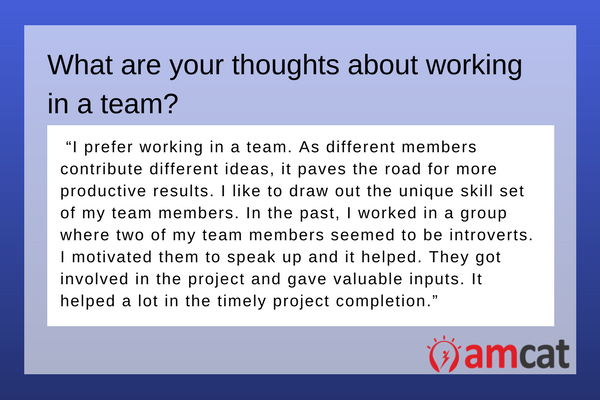
19. What kind of work environment do you expect?

Why this question:
The employer is often interested in knowing if the employee would be able to fit into the environment of the office. Those factors can be the organization structure, leadership style, work-life balance, size of the company, etc. For instance, the environment of a start-up will be quite different than an MNC.What are they ‘really’ asking:
- What a recruiter is asking you with this question?
- Would you be a role-fit in our organisation?
- What are your pain points? Would you leave an organisation if you don’t find your ideal environment there?
How to Answer:
Your answer to this question helps them identify your most productive environment. The best you can do here is show your flexibility. It is better to go to the company’s website in order to have a better understanding of the same.The Right Answer:
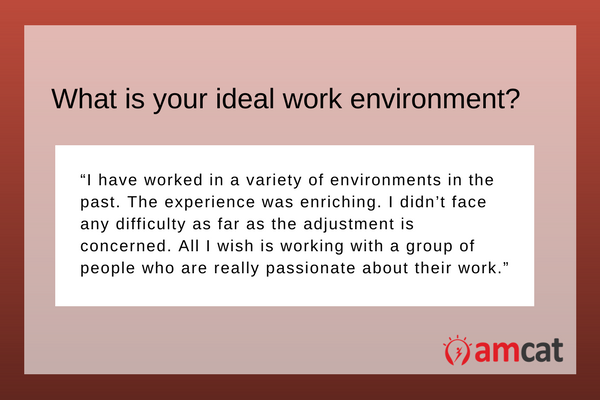
20. Do you have any questions from me/us?

Why this question:
Often interviewers ask this question to understand how well you’re prepared for this interview. They’re checking your preparation, enthusiasm, and readiness to work with the organisation.What are they ‘really’ asking:
They are asking you:
- How keen are you on the job?
- How confident are you about your chances?
- Are you willing to learn from your experiences?
- How eager are you to do this work?
‘How to Answer:
Prepare a list of questions that you want to be answered. Your question should be asked to the relevant interviewer. For example, if your interview is with the HR, your question should focus on the overall interview process or the organization’s structure. In case you are giving an interview to the person who will be your Manager, your question should focus on the kind of work and the work responsibilities.Keep in mind that you don’t ask questions related to off-work activities like party and vacations. Avoid asking personal questions to the interviewer. Try asking one question at a time and make the whole process feel conversational.
The Right Answer:
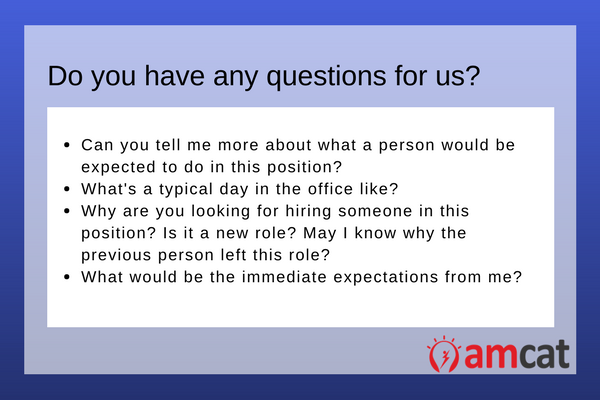
Preparing all these questions beforehand will help you immensely in putting up a confident self for the interview. However, don’t learn the questions by heart or it will sound as if you are just repeating what you crammed up. Remember, the key to actually bagging the job is to maintaining the right body language, as much as it is about answering the questions correctly.
So, even if the question thrown at you is something you are not prepared for, sit up straight, look the interviewer in the eye and answer with confidence and without a quiver in your voice. If you think that the right body language is something that you need to work on and guided through then opt for online interview tools like Mock-AI.
So, be casual, be confident and remember that this is not the last job you could get in the world, so just take it easy!
